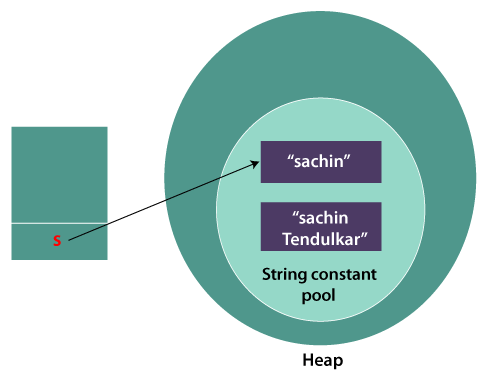Why Are Strings Immutable in Java? Enhancing Code Dependability
Exploring the Benefits of Unalterable Strings in Modern Programs Paradigms
In the realm of contemporary programs paradigms, the principle of unalterable strings stands as a foundation of durable software program advancement. By taking on immutable strings, programmers can guarantee improved data honesty, improved string security, simplified debugging processes, boosted protection procedures, and effective performance optimization.
Enhanced Data Honesty
By protecting against the modification of string objects, immutability gets rid of the risk of unintentional modifications to the data they hold. This not just enhances the safety and security of the info yet likewise improves the dependability of the code that counts on these strings.
Immutability also sustains safer multithreading atmospheres, as concurrent access to unalterable strings does not posture the risk of data corruption through simultaneous modifications. This residential or commercial property simplifies the procedure of dealing with strings in parallel shows situations.
In significance, immutability acts as a safety guard around the data kept within strings, boosting their stability by guaranteeing that when defined, their worths continue to be unchanged throughout the program's implementation.

Boosted String Safety And Security
Immutable strings enhance the thread safety of programs by making certain that once a string things is produced, its worth can not be modified. This residential property removes the danger of simultaneous threads trying to change the same string simultaneously, which could result in information corruption or irregular states in the program - Why are strings immutable in Java?. In a multi-threaded environment, where several threads gain access to and adjust information simultaneously, the immutability of strings supplies a degree of safety and security by ensuring that the information stays unchanged throughout its lifecycle
Streamlined Debugging Processes
Given the improved thread safety facilitated by unalterable strings, a significant benefit develops in the world of simplified debugging procedures. Unalterable strings, once developed, can not be modified, making it simpler to trace the flow of data and recognize the resource of insects in a program. This immutability makes sure that strings continue to be constant throughout the execution of the program, reducing the chance of unanticipated changes that can cause mistakes.
When debugging with mutable strings, developers typically experience problems where a string's value is modified accidentally, making it testing to determine the source of an insect. However, with immutable strings, the information continues to be unmodified, allowing designers to concentrate on evaluating the real logic of the code instead of tracking down where and when a string was customized inaccurately.
In addition, unalterable strings streamline the debugging procedure by making it possible for easier reproduction of insects. Given that unalterable strings do not change state, designers can recreate and examine pests extra properly, leading to quicker identification and resolution of concerns within the codebase. This streamlined debugging see process inevitably adds to greater software program high quality and enhanced general growth performance.

Increased Security Steps
Enhancing data defense and fortifying system honesty, the usage of unalterable strings in software program applications adds substantially to enhanced safety and security actions. Immutable strings also play a vital function in preventing usual security susceptabilities such as barrier overflows and SQL injection strikes, as attempts to adjust string data at runtime are inherently restricted.
Moreover, the immutability of strings enhances the predictability of program habits, making it easier to confirm inputs and protect against unforeseen adjustments that can jeopardize safety and security. This predictability streamlines the procedure of auditing and confirming code, making it possible for developers to recognize possible safety and security technicalities better. On the whole, incorporating immutable strings into software program development methods not only improves the effectiveness and integrity of applications however also strengthens their resilience against safety dangers.
Efficient Performance Optimization
When dealing with mutable strings, procedures site link like concatenation or substring production commonly result in the creation of brand-new string objects, leading to memory expenses and boosted handling time. By permitting strings to remain continuous and unchangeable, unalterable strings promote better memory administration and caching possibilities, inevitably enhancing the general efficiency of the software program.
Immutable strings likewise play a crucial function in multithreaded settings by promoting string security. Why are strings immutable in Java?. Because unalterable strings can not be customized as soon as produced, they can be shared across threads without the threat of unexpected modifications, decreasing the demand for synchronization devices and boosting concurrency. Additionally, unalterable strings simplify debugging procedures as programmers can rely on that a string's worth will stay constant throughout the program's implementation, eliminating prospective mistakes triggered by mutable state changes. To conclude, making use of unalterable strings not only enhances protection yet additionally significantly adds to the efficient efficiency optimization of modern-day software application systems.
Verdict
Finally, the advantages of using immutable strings in modern-day programming paradigms can not be overemphasized. Improved information integrity, enhanced thread security, simplified debugging processes, boosted safety steps, and effective efficiency optimization all add to the general effectiveness of programming jobs. By including immutable strings right into shows practices, designers can gain from a much more dependable and durable codebase.
Immutability, a key attribute of strings in programs languages such as Java and Python, makes sure that once a string item is produced, it can not be altered or changed.Unalterable strings improve the thread safety and security of programs by ensuring that as soon as a string item is produced, its value can not be customized. Unalterable strings likewise play an essential role in stopping common protection susceptabilities such as buffer overflows and SQL shot attacks, as efforts to adjust string information at runtime are inherently limited.
By allowing strings to stay stable and consistent, immutable strings help with much better memory administration and caching possibilities, eventually increasing the overall efficiency of the software application.
Immutable strings streamline debugging procedures as programmers can trust that you could try these out a string's value will continue to be constant throughout the program's execution, eliminating prospective errors caused by mutable state modifications.